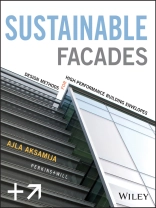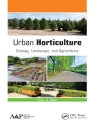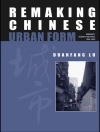Practical information on designing sustainable,
energy-efficient building facades
As energy and other natural resources are being depleted, it has
become clear that technologies and strategies that allow us to
maintain our satisfaction with interior environments while
consuming less of these resources are major objectives of
contemporary facade design. Sustainable Facades focuses on
the strategies and approaches for designing sustainable,
high-performance building facades, and provides technical guidance
for architects and designers.
This timely and useful guide presents strategies and technical
guidelines for designing environmentally sensitive,
energy-efficient facades based on scientific principles. It
provides climate-specific approaches for minimizing energy
consumption, analyzes the thermal behavior of different facade
systems and materials, and illustrates with case studies how these
approaches have been implemented on architectural projects. It also
discusses emerging facade technologies, materials, and systems.
Topics covered in this unique and indispensable guide
include:
* Climate-based design approaches for high-performance
facades
* Characteristics of sustainable facades: energy efficiency,
thermal behavior, and moisture resistance
* Designing for thermal comfort, lighting and glare control, and
acoustic quality
* Emerging technologies in facade design, including smart
materials, double-skin facades, and facades as energy
generators
* Case studies on building orientation and facade design,
tectonic sun exposure control, external shading elements, and
more
Daftar Isi
Figure Credits ix
Acknowledgments xi
Introduction xiii
Chapter 1 Climate-Based Design Approach for Facades 1
Climate Classifications and Types 3
Climate-Specific Design Guidelines for Facades 8
Environmental Considerations and Design Criteria 8
Design Strategies and Climate 9
Chapter Summary 14
Chapter 2 Characteristics of Sustainable Facades 17
Energy Efficiency 18
Orientation 19
Fenestration 24
Facade Types and Materials 40
Opaque Building Facades 40
Glazed Building Facades 48
Materials and Properties 54
Properties of Facade Materials and Components 54
Embodied Energy of Materials 62
Thermal Behavior and Moisture Resistance 66
Control of Heat Transfer, and Air and Moisture Movement 66
Steady-State Heat and Moisture Transfer Analysis for Opaque Building Facades 69
Hygrothermal Analysis for Opaque Building Facades 74
Heat Transfer Analysis for Glazed Building Facades 79
Chapter Summary 83
Chapter 3 Designing for Comfort 85
Thermal Comfort 86
Methods of Measurement 87
Facade Design and Thermal Comfort 91
Daylight and Glare 95
Daylighting Strategies 95
Glare 109
Acoustic Comfort and Air Quality 115
Acoustics 115
Air Quality 118
Chapter Summary 119
Chapter 4 Emerging Technologies in Facade Designs 121
Emerging Materials and Technologies 122
Advanced Facade Materials 122
Smart Materials 126
Double-Skin Facades 135
Double-Skin Facades in Hot and Arid Climates 141
Double-Skin Facades in Cold Climates 143
Facades as Energy Generators 149
Control Systems for Facades 153
Chapter Summary 155
Chapter 5 Case Studies 157
Building Orientation and Facade Design 159
Arizona State University Interdisciplinary Science & Technology Building 159
Center for Urban Waters 167
Tectonic Sun Exposure Control 178
Kuwait University College of Education 178
King Abdullah Financial District Parcel 4.01 Building 186
King Abdullah Financial District Parcel 4.10 Building 200
External Shading Elements 211
University of Texas Dallas Student Services Building 211
Facade Materials and Wall Assemblies 218
Bigelow Laboratory for Ocean Sciences 218
Appendix Case Studies Index 227
Chapter 2 228
Case Study 2.1: Vincent Triggs Elementary School, Clark County Elementary Prototype (Las Vegas, Nevada) 228
Case Study 2.2: Hector Garcia Middle School (Dallas, Texas) 228
Case Study 2.3: Kendal Academic Support Center, Miami Dade College (Miami, Florida) 229
Chapter 3 229
Case Study 3.1: Centers for Disease Control and Prevention, National Center for Environmental Health (Atlanta, Georgia) 229
Chapter 4 230
Case Study 4.1: Princess Nora Bint Abdulrahman University for Women Academic Colleges (Riyadh, Saudi Arabia) 230
Case Study 4.2: Tinkham Veale University Center, Case Western Reserve University (Cleveland, Ohio) 230
Chapter 5 231
Interdisciplinary Science & Technology Building, Arizona State University (Tempe, Arizona) 231
Center for Urban Waters (Tacoma, Washington) 232
Kuwait University College of Education (Shadadiyah, Kuwait) 232
King Abdullah Financial District Parcel 4.01 Building (Riyadh, Saudi Arabia) 233
King Abdullah Financial District Parcel 4.10 Building (Riyadh, Saudi Arabia) 233
University of Texas Dallas Student Services Building (Dallas, Texas) 234
Bigelow Laboratory for Ocean Sciences (East Boothbay, Maine) 234
Index 235
Tentang Penulis
Ajla Aksamija, Ph D, leads Perkins+Will Tech Lab, a center for research of building technologies. Dr. Aksamija’s research expertise includes building science and sustainability, emerging building technologies, digital design and information modeling. She has contributed to several books and has published numerous research articles.
PERKINS+WILL is an interdisciplinary, international design practice offering services in the areas of architecture, interior design, branded environments, planning and strategies, and urban design. Sustainable, high-performance, and environmentally conscious design is the cornerstone of Perkins+Will’s practice that informs every project.












